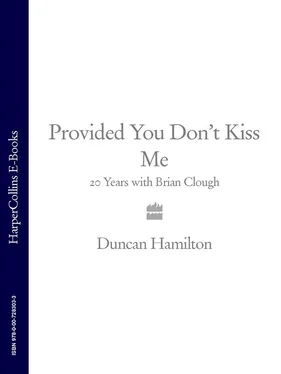DUNCAN HAMILTON
Provided You Don’t Kiss Me
20 YEARS WITH BRIAN CLOUGH

In memory of my parents James and Jenny Hamilton
Title Page DUNCAN HAMILTON
Dedication In memory of my parents James and Jenny Hamilton
Prologue: If Only Football Could Be That Much Fun … Chapter One: Who The Fuck Are You? Chapter Two: The Shop Window … And The Goods At The Back Chapter Three: What A Wast Chapter Four: Striking Gold In Mansfield Chapter Five: Don’T Mention The War Chapter Six: The Average Fa Councillor’s Knowledge Of Football Chapter Seven: Wrestling Sigmund Freud Chapter Eight: There May Be Trouble Ahead … Chapter Nine: Walk Around And Booze Chapter Ten: Even Clark Gable Gets Wrinkles Chapter Eleven: Don’T Forget Me Epilogue: The Greatest Manager Of All Time … Even If I Do Sat So Myself Timeline Goalscoring Record Acknowledgements P.S.: Ideas, Interviews & Features … About the Author Copyright About the Publisher
PROLOGUE
If only football could be that much fun …
The best account of what it is like to be a football reporter was written by B. S. Johnson, an experimental novelist and poet who regularly covered matches for The Observer . His novel The Unfortunates , published in the late 1960s, is Johnson’s ‘book in a box’, an example of modernist literature. It consists of twenty-seven unbound chapters which, except for the first and the last, can be read in any order. The idea, argued Johnson, was to convey the arbitrary nature of thought.
Johnson was a lugubrious man. The Unfortunates is the mournful story of an unnamed narrator (actually Johnson himself) who arrives by train at an unnamed city (coincidentally Nottingham) to cover a football match. He takes a plunge into his past. The surroundings – ‘I know this city’ – awaken in him rich slices of memory that rise up and wash over him like waves. And thus, improbable as it may sound, on a grey Saturday afternoon he drifts from meditations on football and football writing into reflections on life and death. Unlike Bill Shankly, he comes to the conclusion that life is more important than football can ever be.
The sections of the book about football are evocative. Johnson’s narrator reports on a match between City and United – names chosen, I’d imagine, because they represent the game’s Everyman – and slowly peels away the misconceptions about the free seat in the press box. Johnson is miserable and unforgiving, and he has an acid tongue.
Given the number of matches a reporter is obliged to sit through over the course of a season – in my experience, anywhere between sixty and a hundred – and the number of words he has to write about each of them, it isn’t difficult to become, like Johnson’s character, so disillusioned with the trade that cynicism sets in and hardens like cement.
To the outsider, football reporting, like much of what happens inside newspaper offices, gives off a strong glow of romance and glamour, recalling old movies about the press: a hard-bitten, tough-guy, trilby-wearing Bogart balancing a drooping cigarette on the edge of his lip in Deadline USA , or a workaholic Jack Hawkins beating himself into exhaustion in Front Page Story . It’s a world of typewriters, eyeshades and braces, saloon bars and harassed men in belted trench coats bellowing down black, megaphone-sized telephones to a pouting blonde copy-taker. Amid the clatter of the keyboards and the twisted vines of cigarette smoke, each day is a swirl of gripping, unforgettable events.
If only. The truth, especially in the provinces, is that newspaper reporting is often a mundane, repetitive slog: season after season of unbearably joyless matches, one so indistinguishable from another that it becomes impossible – without examining the statistics of teams and goalscorers in Rothmans Football Yearbook – to tell them apart. I came into journalism specifically for the free seat. I wanted to watch sport without paying for the privilege, and sports writing seemed like a decent alternative to real work. Soon I began to understand what Robert Louis Stevenson meant when he wrote that it is a better thing to travel hopefully than to arrive.
The beautiful game can seem ugly and dull when viewed through tired and jaded eyes. It looks worse when in early March you find yourself recycling phrases, already soiled by overuse, that you originally wrote in August or September. Worse still, after a while you learn to routinely fabricate an emotional response to something about which you feel absolutely nothing. This is exactly what Johnson conveys so well in The Unfortunates :
Always, at the start of each match, the excitement, often the only moment of excitement, that this might be the ONE match, the match in which someone betters Payne’s ten goals, where Hughie Gallacher after being floored nods one in while sitting down, where the extraordinary happens, something that makes it stand out, the match one remembers and talks about for years afterwards, the rest of one’s life. The one moment, the one match. A new beginning, is it? But already I suspect the worst … have to be prepared, as always, in everything, to settle for less.
Even a cursory flick through Jonathan Coe’s biography of Johnson, Like A Fiery Elephant , reveals a man not only at odds with life but tragically soured by it. His bitter dissatisfactions, frustrations and, eventually, profound unhappiness led to his suicide in 1973. None of this devalues Johnson’s opinions. Whatever his demons, the darts he threw from the pages of The Unfortunates always fell near, or directly inside, the bullseye. He knew . He had been there and felt it.
When Johnson buys a football paper, bowed by the weight of stale phrases such as ‘star-studded forward line’ and ‘shooting boots’, he says, relieved: ‘I don’t have to write that sort of preliminary speculative meaningless crap. Just my own kind of crap.’
Handed the attendance figure on a slip of paper, he laments: ‘24,833 poor sods have paid good money to see this rubbish’, and later tartly adds: ‘Not even a bloody quote from the crowd … cowed by seeing rubbish like this nearly every week, I should think.’
He complains about the press box dirt that ‘blows across my pages’ and the ‘cramped seat’. He is scathing about the ‘Heavy Mob’ – his sobriquet for red-top tabloid reporters, who are castigated as ‘the well paid pseuds … armed to the teeth (with) Colour and Metaphor’.
Most significantly, however, he puts across the monotonous grind of weekly football reporting and its ritualistic language – the words manufactured in a mechanical, depressing way as if by a blank-eyed factory worker turning out rivets. In a single sentence he sums up the way I often felt towards the end of a season, sometimes in the middle of it: ‘Bollocks to this stinking match.’
Johnson was lucky – he was a part-timer. His football reporting supplemented the serious work of creating novels and poems. Although Johnson complained about it – and about the subeditors who, he thought, desecrated his copy with crass, overzealous use of the blue pencil – he pressed on with football writing because he was at heart a football man. He arrived at a ground each Saturday hoping that he wouldn’t be disappointed again.
How well I knew that feeling. For seventeen years I covered football for two freelance agencies, one national newspaper and for the Nottingham Evening Post . Apart from one season covering Notts County (which, because of its manager, Jimmy Sirrel, was like dropping into the Fifth Circle of Dante’s Hell), I followed Nottingham Forest.
Читать дальше













